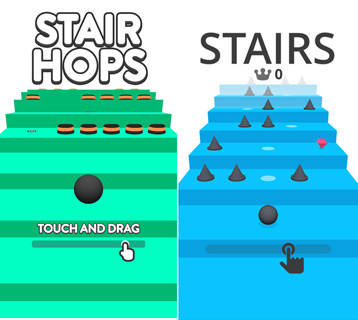Does Ketchapp clone games?

Good old horror story "If you release a successful game, then Ketchup copies it in a week" has long been among the game developers . Some believe that this is true; others are stupid gossip. This time, she found a fresh, piping hot example, worthy of discussion (I note right away that in this situation, not everything is unambiguous).
Over the weekend, Burak Kurkcu, a developer from Turkey, attracted wide public attention. In his Twitter, he told that the publisher Ketchup and the developer Yuri Sanachev inclined his mobile game Stair Hops . Moreover, in contrast to the original game, created in two months and released a clone of Ketchapp called Stairs got into the TOP-10 and brings a good earnings to the publisher.
From a legal point of view (and based on similar experiences of other developers), there is little that can be done - the developer uses his own assets (images, sounds, code), so games cannot be confused, and game mechanics are not subject to copyright (you can patent them and try to defend in court, but it was necessary to do this before the release).
')
Here one can argue whether the game of the “infinite jumper” genre is original in principle - the developer himself claims that prior to the release of his game no analogues in the App Store existed.
Moreover, if we carefully look at Yuri's other applications , we will see that simultaneously with the author of the original he released another “infinite jumper” , Hop , based on a ready-made project from the Unity Asset Store , which makes this question even more confusing.
In the comments, another developer cited another example of a clone of his application, also released by Ketchapp (which, by the way, belongs to Ubisoft since September 2016):

It is known that the popular game Clash Royale was first declined for less than a month after its release, and today there are many clones of this game - after all, their creators of the clone do not have to spend money on design and invent game mechanics.
On the other hand, if game mechanics and ideas would become the subject of copyright, then developers would have to pay royalties for the simplest game actions (for example, moving a player around the screen or jumping).
Do you think this approach to business is ethical?
Source: https://habr.com/ru/post/344950/
All Articles